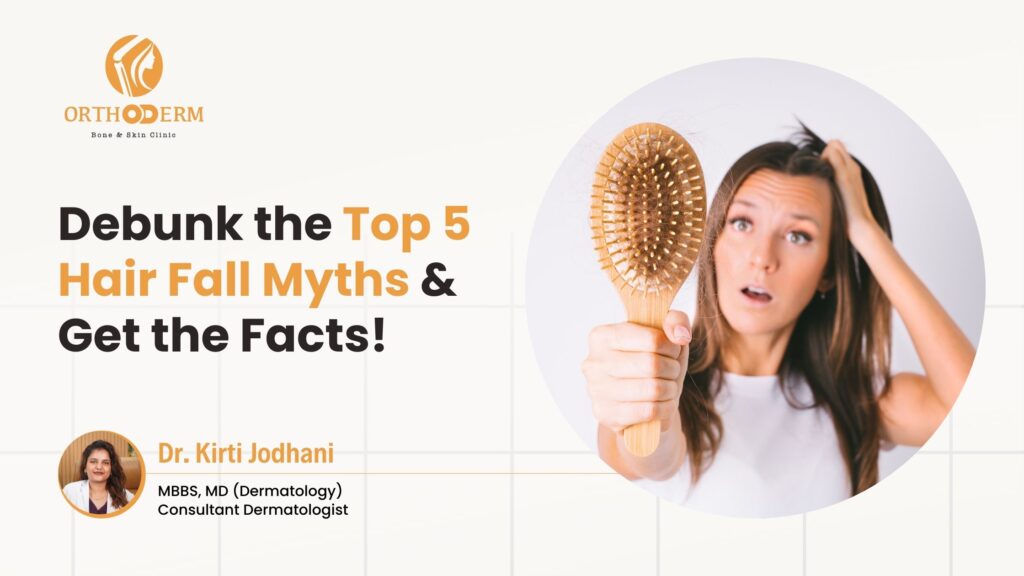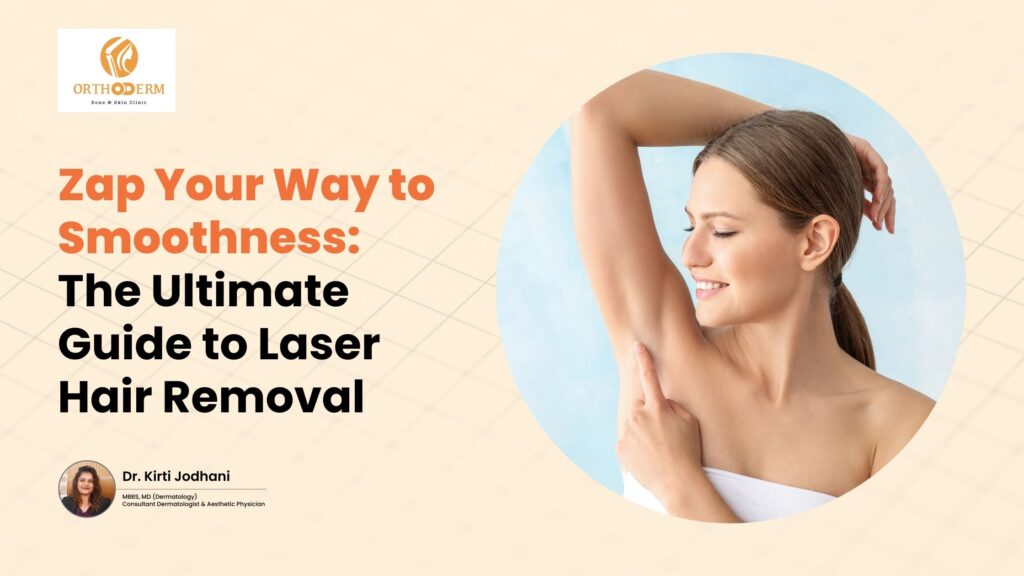As a dermatologist, I see many patients come through my clinic concerned about hair loss. It’s a common issue, affecting millions of people worldwide. But often, these concerns are fueled by myths and misinformation circulating online. Today, let’s clear the air and debunk the top 5 hair fall myths! We’ll explore the science behind hair loss and empower you with accurate information to address your hair health concerns effectively.
Myth #1: Wearing hats causes hair loss.
This is a persistent myth that has many people worried about their favorite headwear. Let’s address this concern head-on. Hair loss is primarily influenced by what’s happening beneath the scalp, not on top of it. Your hair follicles receive their nourishment from blood flow, not from direct contact with air. So, wearing a hat, even regularly, doesn’t suffocate your hair or restrict its growth.
However, it’s important to note that tight hats can contribute to hair breakage, especially if worn for extended periods. This breakage can make your hair appear thinner, but it’s not true hair loss. So, the key takeaway here is to choose well-fitting hats that allow for comfortable airflow and avoid excessive tightness that might pull on your hair.
Myth #2: You inherit hair loss only from your mother’s side.
This is a half-truth that can be misleading. While there’s some logic behind it, the genetics of hair loss are a bit more complex. Indeed, a specific gene associated with male pattern baldness (androgenic alopecia) resides on the X chromosome. Men inherit one X chromosome from their mother and one Y chromosome from their father. So, there seems to be a connection to the maternal side.
However, here’s the twist: hair loss isn’t solely determined by a single gene. It’s more likely a combination of genes from both parents that influence your susceptibility to hair loss. Additionally, these genes might not always be expressed, meaning you could inherit the genes but not necessarily experience hair loss.
The bottom line? While your mom’s family history might offer some clues, it’s not the sole predictor. Hair loss can come from either side, and the specific genetic mix plays a more significant role.
Myth #3: Frequent shampooing leads to hair loss.
This is a widely held belief, but it’s simply not true! Here’s why: Your scalp naturally produces sebum, an oily substance that helps keep your hair hydrated. However, excess sebum can build up on your scalp, attracting dirt and clogging hair follicles. This can lead to a variety of issues, including an itchy scalp, dandruff, and even impede healthy hair growth.
Regular shampooing helps remove this buildup, promoting a clean and healthy scalp environment for your hair to thrive. Think of it like tending a garden! You wouldn’t let weeds and debris accumulate – shampooing does the same for your scalp, creating optimal conditions for healthy hair growth.
Of course, the key is finding the right balance. While frequent cleansing is beneficial, over-washing can strip your scalp of its natural oils, leading to dryness and irritation. The ideal frequency depends on your hair type and activity level. If you’re unsure, I recommend consulting a dermatologist to determine the best shampooing routine for your specific needs.
Myth #4: Cutting your hair makes it grow faster.
This is a common misconception that’s been around for ages! It might seem logical – trim the ends, and voila, faster-growing hair. But unfortunately, hair growth happens at the root, deep within the scalp, far from where you snip those split ends. Cutting your hair has no impact on the rate of hair growth itself.
However, there’s a reason why many people feel like their hair grows faster after a trim. Here’s the secret: split ends can travel up the hair shaft, causing breakage and making hair appear thinner and shorter. By removing these damaged ends, a haircut creates the illusion of thicker, fuller hair, and healthy hair growth from the root becomes more noticeable.
So, while a trim won’t magically accelerate hair growth, it can significantly improve the overall health and appearance of your hair, making it seem like it’s growing more quickly.
Myth #5: Hair loss is permanent.
This one can be quite discouraging, but the truth is more nuanced. Hair loss can be categorized into two main types: temporary and permanent.
Temporary hair loss is quite common and can be caused by various factors like stress, hormonal changes (pregnancy, menopause), certain medications, or even nutritional deficiencies. The good news is that once the underlying cause is addressed, hair growth often resumes, and you can regain your lost hair.
Permanent hair loss, however, is typically associated with conditions like male pattern baldness (androgenic alopecia) or female pattern hair loss. These are influenced by genetics and hormonal factors, and hair loss tends to be progressive.
While there isn’t a complete cure for permanent hair loss, there are effective treatments available to slow down the progression, promote existing hair growth, and even explore options like hair transplantation for certain cases.
The key takeaway here is that experiencing hair loss doesn’t automatically mean it’s a permanent situation. A consultation with a dermatologist can help determine the cause of your hair loss and explore the most suitable treatment options to address it effectively.
Conclusion
So there you have it! We’ve debunked five of the most common hair loss myths. Remember, accurate information is key to addressing hair concerns effectively. If you’re experiencing hair loss, don’t hesitate to schedule a consultation with us. We can work together to diagnose the underlying cause and explore personalized treatment options to help you achieve your hair health goals. Healthy hair is achievable, and with the right approach, you can feel confident and beautiful!
FAQ on Hair Fall Myths and Facts
Here are some of the most frequently asked questions I receive from patients about hair loss:
Q: I’m washing my hair less to prevent hair loss, is that right?
A: As discussed earlier, frequent shampooing itself doesn’t cause hair loss. Regularly cleansing your scalp removes excess oil and buildup, promoting a healthy environment for hair growth. The key is finding the right balance for your hair type – consult a dermatologist to determine the ideal shampooing routine for you.
Q: Should I avoid styling products because they damage my hair and cause hair loss?
A: Not necessarily. While some harsh chemicals or excessive heat styling can contribute to breakage, many styling products are formulated to be gentle on hair. The key is to choose products suitable for your hair type and use them in moderation. Additionally, applying heat protectants before using heat-styling tools is crucial to minimize damage.
Q: Can stress make me lose hair?
A: Yes, stress can be a contributing factor to temporary hair loss. When under significant stress, the hair growth cycle can be disrupted, leading to increased shedding. Fortunately, once the stressor is addressed, hair growth typically resumes.
Q: Are there any vitamins or supplements that can help with hair loss?
A: While a balanced diet is essential for overall hair health, there’s no single “miracle” vitamin for hair loss. However, deficiencies in certain vitamins and minerals like iron, biotin, and vitamin D can sometimes contribute to hair loss. If you suspect a deficiency, a blood test can help determine if supplementation might be beneficial.
Q: What are some lifestyle habits that can promote healthy hair growth?
A: Excellent question! Several lifestyle practices can contribute to healthy hair. These include:
- Maintaining a balanced diet rich in essential nutrients.
- Getting enough quality sleep.
- Managing stress levels through relaxation techniques.
- Drinking plenty of water to stay hydrated.
If you have further questions or concerns specific to your hair loss experience, please don’t hesitate to schedule a consultation with us. We are here to help you achieve healthy, beautiful hair!



